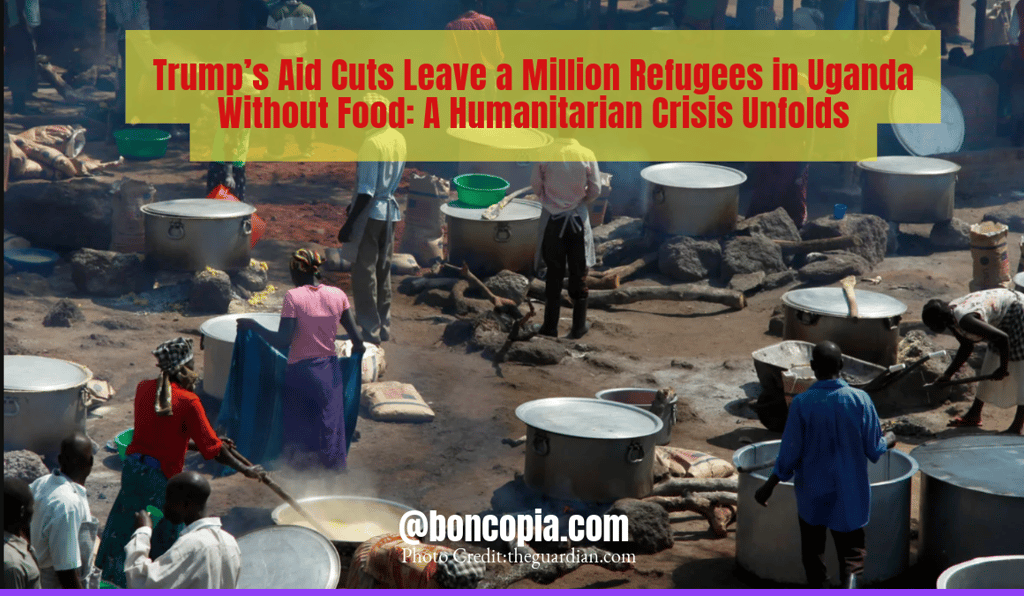Trump’s Aid Cuts Leave a Million Refugees in Uganda Without Food: A Humanitarian Crisis Unfolds
5/4/20253 min read


Trump’s Aid Cuts Leave a Million Refugees in Uganda Without Food: A Humanitarian Crisis Unfolds
Introduction: A Crisis in the Making
Imagine fleeing war, violence, and persecution, only to find yourself in a new country where the lifeline of food aid suddenly vanishes. This is the stark reality for over a million refugees in Uganda, where the United Nations World Food Programme (WFP) has halted food rations due to a severe funding shortfall. Recent reports point to U.S. aid cuts under the Trump administration as a key driver of this crisis, raising fears of malnutrition, desperation, and even forced repatriations to war-torn countries. As Uganda, Africa’s largest refugee-hosting nation, grapples with this humanitarian emergency, the world must confront the consequences of slashed aid budgets and the human cost of political decisions.
The Crisis: Food Rations Cut for a Million Refugees
Uganda hosts 1.8 million refugees, with 60,000 new arrivals in the last three months alone, primarily from the Democratic Republic of the Congo, South Sudan, and Sudan. The WFP, a critical provider of food assistance, announced this week that it has cut off rations for one million refugees due to a lack of funds. Malnutrition rates in refugee settlements have already reached a critical 15% or higher, signaling a deepening humanitarian disaster. The agency urgently needs $50 million to restore aid and prevent further deterioration. Without immediate action, refugees face starvation, and Uganda may resort to forced repatriations, pushing vulnerable people back into conflict zones.
The Role of U.S. Aid Cuts
The Trump administration’s foreign aid policies have been cited as a major factor in this funding crisis. Since taking office in January 2025, President Trump has prioritized an “America First” approach, freezing and canceling billions in foreign assistance, including USAID programs that supported the WFP. In Uganda, just 46% of the $858 million needed for the 2024 Refugee Response Plan was funded, with the U.S. historically being a top donor. The WFP and UNHCR are now in “total crisis,” according to local activists, as other donor countries have also failed to meet their commitments. These cuts are part of a broader pattern, with U.S. funding terminated for WFP programs in 14 countries, including Afghanistan and Yemen, threatening millions with hunger.
The Human Impact: Stories from the Ground
At Uganda’s Bidi Bidi camp, one of Africa’s largest refugee settlements, the absence of food aid is already felt. Refugees like those cooking maize porridge donated by USAID in better times now face empty kitchens. “Without food, people might be forced to go back to their home countries where we fled from or engage in illegal activities to survive,” said a local activist. The fear of forced repatriations looms large, with Uganda’s cabinet reportedly discussing the issue. For families who have escaped war, the prospect of returning to danger is unimaginable, yet the lack of aid leaves them with few options.
Why It Matters: A Global Ripple Effect
The crisis in Uganda is not an isolated event. The WFP warns that 58 million people worldwide are at risk of extreme hunger due to funding shortages. Aid cuts destabilize not only refugee communities but also host countries like Uganda, which have shown remarkable generosity despite limited resources. Reduced aid can fuel migration, conflict, and extremism, undermining global stability—outcomes that even donors like the U.S. have historically sought to prevent. The Trump administration’s reversal of some aid cuts in countries like Lebanon and Somalia shows the complexity of these decisions, but the exclusion of critical regions like Uganda highlights the uneven impact of policy shifts.
What Can Be Done?
The WFP’s call for $50 million is a starting point, but long-term solutions require collective action. Donor nations must step up to fill the funding gap, while humanitarian organizations explore innovative financing, such as private-sector partnerships. Advocacy groups like OneAID are pushing for the restoration of USAID contracts, emphasizing that aid is not just charity but a strategic tool for global security. Individuals can contribute by supporting NGOs like the WFP or raising awareness about the crisis. The international community must also pressure Uganda to avoid forced repatriations, ensuring refugees’ rights are protected under international law.
Conclusion: A Call to Action
The suspension of food rations for a million refugees in Uganda is a humanitarian tragedy that demands urgent attention. As the WFP scrambles to secure funding and refugees face the specter of starvation or forced return to war, the world cannot afford to look away. The Trump administration’s aid cuts have exposed the fragility of global humanitarian systems, but they also present an opportunity for renewed commitment to those in need. By acting swiftly, we can help restore hope to Uganda’s refugees and reaffirm our shared humanity.
Thought-Provoking Questions
How should the international community balance domestic priorities with the moral obligation to support refugees in crisis?
Are foreign aid cuts like those in Uganda inevitable in an era of nationalist policies, or can global cooperation prevail?
What role can individuals play in addressing humanitarian crises when governments scale back support?
Word Count: 614
hello@boncopia.com
+13286036419
© 2025. All rights reserved.